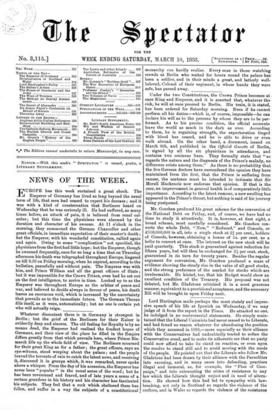Lord Hartington made perhaps the most stately and impres- sive
speech of his life at Ipswich on Wednesday, if we may judge of it from the report in the Times. He attacked no one, he indulged in no controversial statements. He simply main- tained that the Liberal Unionists had never ceased to be Liberals, and had found no reason whatever for abandoning the position which they assumed in I886,—more especially as their alliance with the Conservatives had undoubtedly tended to soften the Conservative creed, and to make its adherents see that no party could now afford to take its stand on reaction, or even upon the resolve to stand still and to avoid moving with the needs of the people. He pointed out that the Liberals who follow Mr. Gladstone had been drawn by their alliance with the Parnellites into excusing, and in many cases into defending, practices illegal and immoral, as, for example, the "Plan of Cam- paign," and into extenuating the crime of resistance to any law which the Liberals thought unjust and in need of altera- tion. He showed how this had led to sympathy with law- breaking, not only in Scotland as regards the violence of the crofters, and in Wales as regards the violence of the resistance
to tithes, but in London as regards the violence of the crowds which chose to avail themselves of the distresses of the unem- ployed; and he declared that the so-called "Coercion" Act was nothing but the necessary remedy for Irish lawlessness, which might become a dead-letter at once, if the Irish leaders would but act on the constitutional principles for which their Liberal allies used to contend, though now they contend for them no longer. Ile hoped that the Local Government Act would teach the Irish how much they might enjoy of local freedom without insisting on a repeal of the Legislative Union, though, of course, he approved of the decision of the Government not to complicate the discussion of the measure by including Ireland at present in its scope. The meeting was crowded and enthusiastic. But at the " overflow " meeting the Home-rulers mustered strong, and when the greater number of the Unionists had left, carried a resolution approving Mr. Glad- stone's Irish policy.



















































